Introduction
The introduction of drugs which may lead to substance abuse can happen from many different avenues. Some may be introduced to medications through pain prescriptions, some by peer pressure, recreation or by curiosity. Most addicts tend to start young and use recreationally at a young age when they feel peer pressure to party with little thought of the risks.
Self-medication
The overall feeling of well-being received from these substances makes it easier to use them again in order to bring back that good feeling, neutralize anxieties, depression and life's stresses. There remains a feeling of self-control, the user believe he can stop anytime he wants to and there is little motivation to worry about the risk of addiction.
Compulsion
As it gets easier to self-medicate, the user is less likely to think about consequences. He or she continues to believe it is possible to stop before it becomes a problem. No one knows when that line is crossed until he or she discovers they have crossed it.
Addiction
This is the stage of physical dependency and the realization that this drug or alcohol is needed to feel normal. The addict discovers that without it, he or she feels very ill. Extreme anxiety, depression and stress takes over where at one time, the drug worked to eliminate it. Medical intervention and support may become necessary at this point although most will still believe they can do this on their own. Emotional distress is extremely high as the addiction becomes a realization for you.
Critical stage
The brain has been severely traumatized and most likely damaged at this point. Uncontrollable and unpredictable behavior, often violent, take over. The drug is all you think about as your life unravels. Long-term support is critical as are years of physical and psychological assistance. The risk of overdose resulting in permanent brain damage, coma or death is highly likely. It is at this point that suicide may be viewed as the only way out. It is critically important to be surrounded by a strong support system and in a safe controlled environment. If you can get into a detox program and/or rehab, get there! You will most likely be put on medication to help you avoid cravings and manage your addiction. Late stage addiction is recognized by frantic behaviors and deep fears (for the addict and family) of hopelessness and death. INTERVENTION is critically necessary in order to hold on to life. Once stabilized, you can proceed with your options for treatment.

